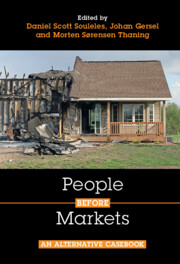Book contents
- People Before Markets
- People Before Markets
- Copyright page
- Dedication
- Contents
- Contents by Topic
- Authors
- 1 Introduction: Why Are You Here?
- 2 Some Philosophical Help with “Neoliberalism”
- Part I Our World
- 3 Where Should Food Come From?
- 4 Where Should Water Come From?
- 5 Who Gets to Own Land?
- 6 How Should Food be Produced?
- 7 Who Decides Where They Live?
- 8 How Much Land Do We Need?
- 9 Where Should We Park?
- 10 How Should We Deal with Climate Change?
- 11 How Should We Make an Impact?
- Part II Our Lives
- Part III Our Work
- Index
- References
6 - How Should Food be Produced?
from Part I - Our World
Published online by Cambridge University Press: 27 October 2022
- People Before Markets
- People Before Markets
- Copyright page
- Dedication
- Contents
- Contents by Topic
- Authors
- 1 Introduction: Why Are You Here?
- 2 Some Philosophical Help with “Neoliberalism”
- Part I Our World
- 3 Where Should Food Come From?
- 4 Where Should Water Come From?
- 5 Who Gets to Own Land?
- 6 How Should Food be Produced?
- 7 Who Decides Where They Live?
- 8 How Much Land Do We Need?
- 9 Where Should We Park?
- 10 How Should We Deal with Climate Change?
- 11 How Should We Make an Impact?
- Part II Our Lives
- Part III Our Work
- Index
- References
Summary
After the end of formal colonialism, numerous neoliberal international organizations stepped in to manage the international affairs of newly independent nations. The presumption of governments was that the best way to create national welfare was to let markets steer production by integrating the nation into an international capitalist order premised on market specialization and debt relationships. Here Freeman looks at the sort of industrial agricultural production that this kind of geopolitical arrangement engenders, focusing on pineapple plantations in Costa Rica. Cost Rican pineapple planatations are monocrops that exhaust the fertility of the land, provide poorly paid dangerous work, and spread toxic pesticides. International neoliberal governance structures with the overriding priority of stimulating market competion have enabled a system where production for the global is the objective. By contrast, Freeman shows what a food-growing setup can look like if it is oriented toward local production and away from international markets by examining “agroecology” in Haiti.
Keywords
- Type
- Chapter
- Information
- People before MarketsAn Alternative Casebook, pp. 117 - 139Publisher: Cambridge University PressPrint publication year: 2022

